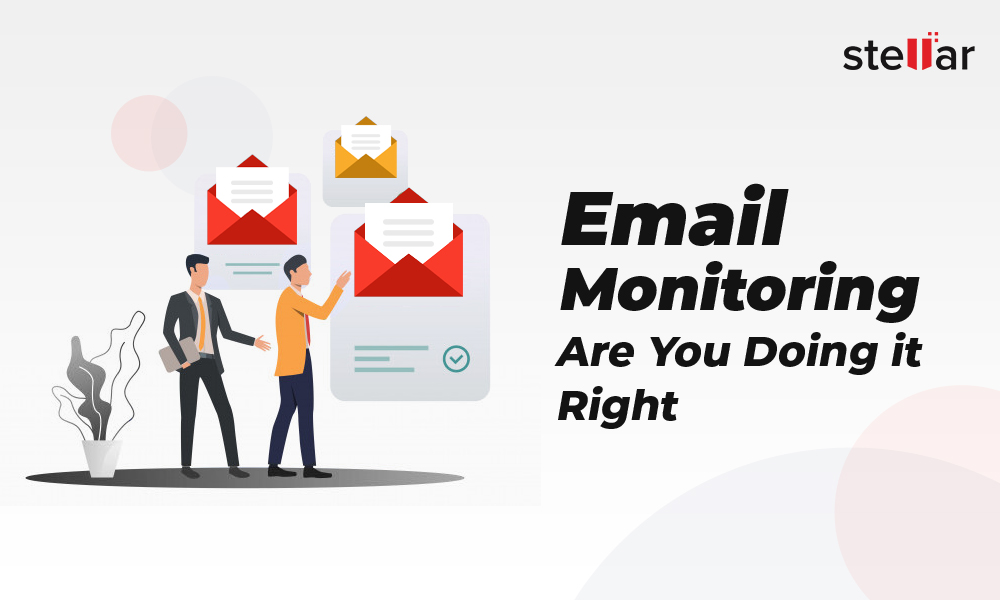Summary: Email monitoring is one of the most important steps toward cyber hygiene to protect organizations from any unwanted event due to malicious activity from inside or outside. Here we have provided the guidelines for an effective email monitoring policy. We also shared our views on the legality of an Email Monitoring policy. Characteristics of an eDiscovery email investigation tool, such as Stellar Email Forensic, are also specified that support multiple email platforms and message views.
Emails, which are sent or received by employees through company-provided email accounts, are not usually considered private. Employers have the right to monitor these emails in the interest of the company. Email monitoring also helps a company to prevent data leaks, theft of trade secrets, or any other malicious activity. In this post, we have discussed email monitoring in detail, its legality, and things to keep in mind while formulating an email monitoring policy.

What is Email Monitoring?
Email monitoring is important to protect your company from any untoward event that may occur due to malicious activity of your employee or external attacks, such as phishing, spam, etc. Below given are some possible reasons that may require you to implement employee email monitoring measures in place:
- Keeping tabs on an employee’s official emails ensures that the employee is efficiently using the company’s time. It will also help you get an insight into general workplace conditions by checking internal email communication among your employees. This can help in evaluating company policies accordingly.
- Employees are often entrusted with sensitive business data, such as trade secrets, business accounts, intellectual properties, etc. However, unscrupulous elements in your organization may compromise such data. If company emails are actively monitored, you can detect a potential threat early on and prevent damage.
- Emails from spammers/malicious senders can pose threats like phishing attacks, malware infections, social engineering scams, etc. By monitoring incoming emails, suspicious messages can be inspected closely to contain a potential threat in time.
The legality of Email Monitoring
Generally, employers have the right to monitor work emails sent or received by their employees. United States law dictates that any email an employee sends or receives on a company system is the employer’s property and can be reviewed by the company at any time. Similar laws can be found in other countries, which authorize the employer to monitor employees’ emails. Still, it’s a good idea to mention email monitoring in the company policy document. Intimating employees about the policy beforehand will deter them from using company email accounts for purposes other than what they are intended for.
Guidelines for an Effective Email Monitoring Policy
Though, as an employer, you have a legal right to read your employees’ emails, drafting an effective email policy is still suggested. Following are some guidelines to monitor emails effectively:
- Make it clear to all employees that company email accounts are for business purposes only, and all sent and received emails are the company’s property.
- Clearly define email communication rules to minimize the risk of threats like phishing attacks. These may include encrypting emails while sharing sensitive company information and documents, avoiding clicking suspicious email links, etc.
- Set guidelines for retaining the emails, such as what emails employees should retain, for how long, and through what process.
- Define the actions that can be taken against employees who fail to comply with the guidelines.
- To maximize the security of the company’s core network, deploy SMTP servers in the perimeter network and monitor all inbound and outbound emails. You can also set up scanning services for malware, phishing attacks, spam, etc. in these servers.
- Enable Mailbox Auditing on company mailboxes to track and record all the actions performed by a mailbox owner when logged on. These can be accessed in an event of a security threat or data breach for investigation.
- Actively look for common signs of email threats while monitoring and filtering company emails. For instance, some common signs of phishing attacks include misspelled domain names, legitimate links mixed with fake links, etc.
Even if you put an email monitoring process in place, you may encounter a data breach, phishing attack, or data exposure due to unwarranted email send-outs. In such a case, you must thoroughly investigate all the employees’ emails to find the culprit. For this, you can take the help of specialized email investigation tools, such as Stellar Email Forensic. This advanced email analysis software supports multiple email platforms and message views. You can easily search for a particular email message using the software’s Boolean Search and Regular Expression Search functions. You can also use the tool to recover deleted emails and for investigative case management with features such as bookmarks, tags, and logs. In addition, you can create detailed case reports that can be submitted as evidence in court if needed. This software also allows the automatic calculation of MD5 and SHA1 hash values corresponding to individual emails in the entire mailbox data.
Was this article helpful?